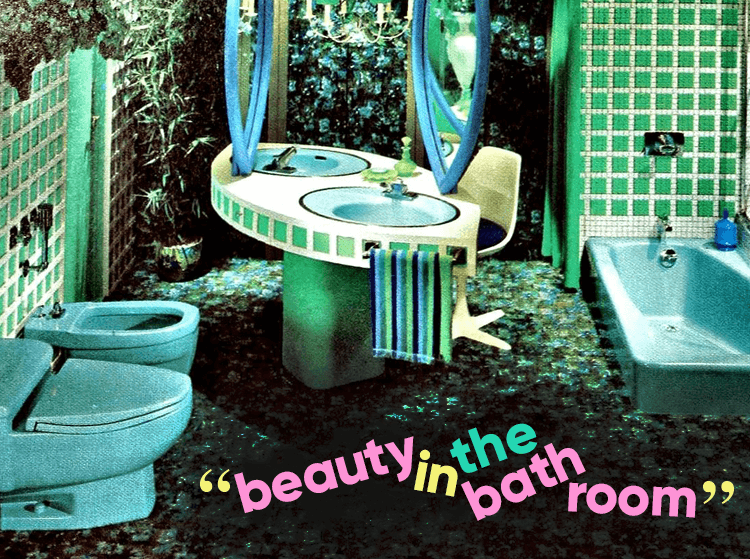Who among us is immune to the seductive charm of a campy, romantic bathroom? The kitsch, the carpet, the baths, the bubbles – they’re just so silly! How could you not fall in love?
These sappy, swanky bathrooms might be considered tacky now, but in 1960s’ America, they were the height of glamour and sophistication.
So how did romantic bathrooms become so instantly iconic and what happened to their allure? Wow, so glad you asked because that’s exactly what this blog post is about.
Taking technology home
As technology advanced, so did bathrooms, but not as quickly as you might think. It wasn’t until the 20th century that it was commonplace to have bathrooms in single family homes. While wealthier Americans had the privilege of a flush toilet and indoor tub, poorer folks living in dense tenement buildings still shared bathtubs, toilets and laundry facilities, with sometimes just a few toilets per building. All of that changed after World War II (and the Tenement House Law).
Post WWII, the US middle class was in great spirits and in an ever greater financial position. During the 1950s housing boom, gizmos and gadgets became status symbols, especially for American women. Think of all of those wacky, vintage kitchen appliance ads you’ve seen. It was just a matter of time until that aesthetic made its way into the other most important room in the house – the bathroom.
All of a sudden, the bathroom became representative American individualism and middle class luxury. Ann Reagan explains, “There was a demand for color, pattern, tile and beauty in the bathroom. Escapism was another popular use of the bathroom and it represented privacy and retreat.”
The bathroom was no longer just a place of function. It became a vehicle for self-care and, even more revolutionary, self-expression.
Free love and cheap motels
Self-expression was basically the tagline of the sexual revolution. Movies, music and general pop culture were increasingly revolved around pleasure and carnal sensuality. The BBC reports:
Adorned with sunken bath, bidet, shag-pile carpet, louvred wardrobes, plastic mirror cabinets, swirly patterned waterproof wallpaper and even a Jacuzzi, the archetypal ‘60s bathroom was the very model of a private “bagnio.”
Bagnio, at it’s most tame, is just a bathhouse. But more often than not, it’s a brothel.
We’d be remiss if we didn’t address the most notorious romantic bathroom feature – the heart shaped tub. Designed by Morris B. Wilkins in the early ’60s, the heart shape tub was an attempt to lure newlyweds to his string of motels in New York’s Pocono Mountains, about 90 minutes outside of New York City.
Needless to say, the tubs were a roaring (bubbling?) success. A 1971 Life magazine article called the design “a surfeit of affluent vulgarity,” but the pictures more than sold the design. Manufacturers started making fibreglass shells in a heart shape, and soon the tubs were a honeymoon staple.
The bathroom is political
Ronald Reagan’s win in the US’s 1980 presidential election ushered in a new era of conservative politics, family values and, yes, bathrooms. There was also a new counterculture that was in stark contrast to the hippy social mores of the ‘60s and ‘70s – the yuppie.
History.com defines a yuppie as, “a baby boomer with a college education, a well-paying job and expensive taste.” All about speed, function and the bottom line – the yuppie bathroom rebelled against the campy extravagance of romantic bathrooms. Instead, they went for sleek marble look that led right into the ‘90s’ minimalist design.
And just as quickly as it first entered the scene, the romantic bathroom was gone. Well, that’s not totally true. There’s a Holiday Inn in Anaheim, California (by Disneyland) that has a couple of rooms with heart shape tubs. While they’re expensive to upkeep and difficult to clean, the hotel says that they pay for themselves in guest reservations. Do we smell a comeback?
Just because we’re curious, is there any decor you’ve added to your bathroom to make it more romantic? And is it heart-shaped?




